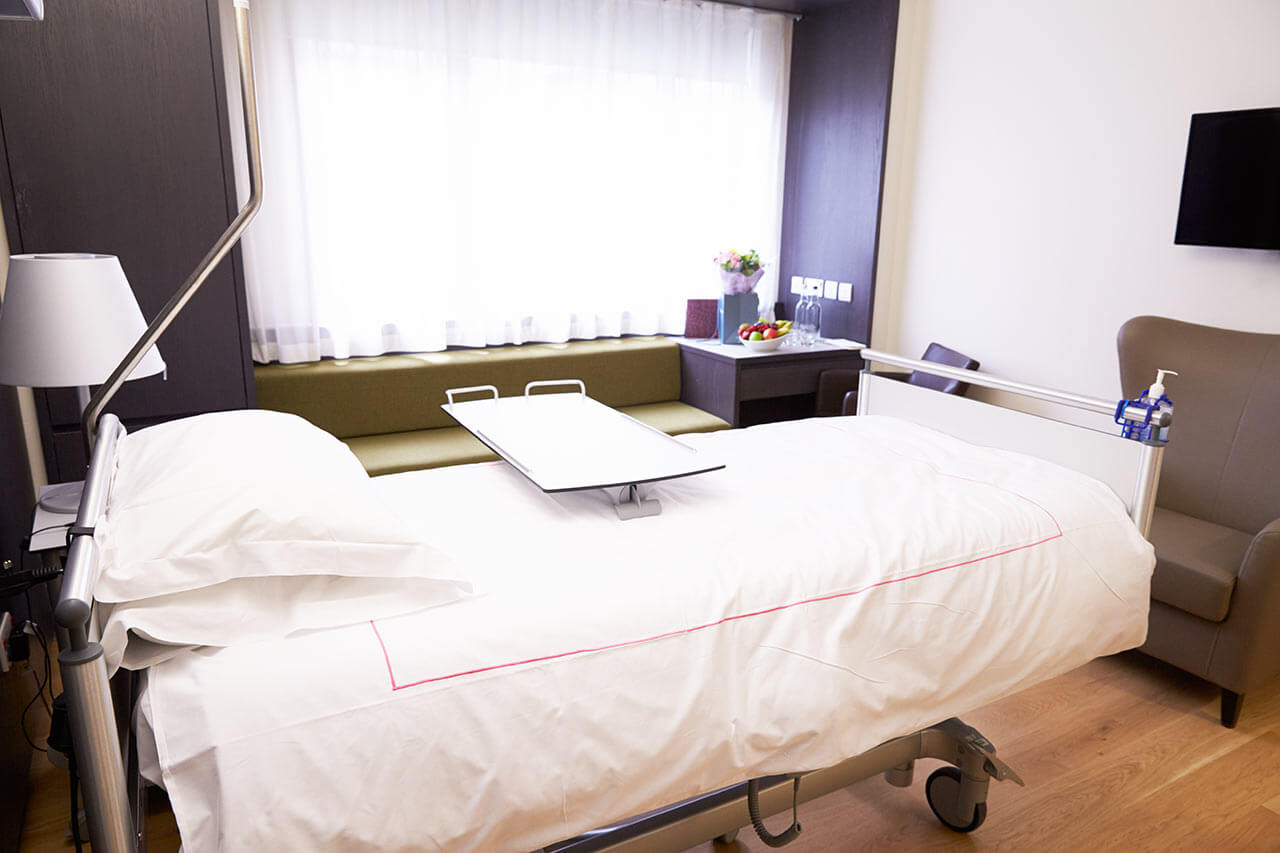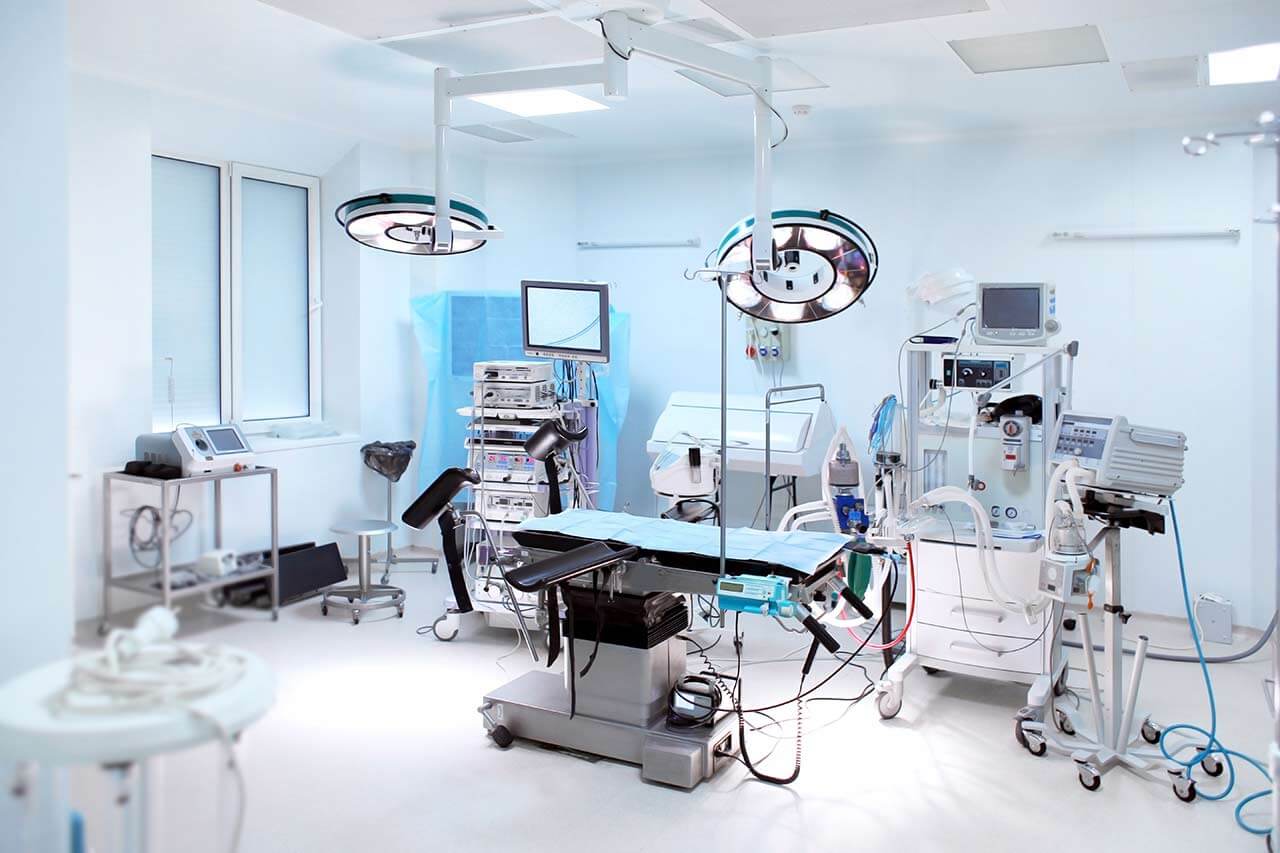
The program includes:
- Initial presentation in the clinic
- clinical history taking
- review of medical records
- physical examination
- laboratory tests:
- complete blood count
- biochemical analysis of blood
- thyroid function test (TSH-basal, fT3, fT4)
- mineral metabolism analysis (Na, K, Ca, Mg)
- lipid metabolism (HDL/LDL, cholesterol, triglycerides,
Lip(a), homocysteine) - iron content (ferritin, iron)
- blood coagulation analysis (aPTT, PT, INR)
- metabolic status (uric acid, total glucose, HbA1c)
- inflammatory parameters (CRP, ESR)
- cardiovascular disease risk markers
- lung function test (Spirometry)
- resting and exercise ECG
- Holter monitoring (24h)
- color doppler echocardiography
- transesophageal echocardiography (tee)
- color doppler sonography of cerebral vessels
- preparation according to preoperative standard
- occluder implantation
- symptomatic treatment
- control examinations
- the cost of essential medicines and materials
- nursing services
- full hospital accommodation
- explanation of future recommendations
- written statement
Required documents
- Medical records
- Echocardiography (if available)
Service
You may also book:
 BookingHealth Price from:
BookingHealth Price from:
About the department
The Department of Cardiology at the ATOS Orthoparc Clinic Cologne specializes in the prevention, diagnosis, and treatment of cardiovascular disease. Believing that the best treatment is prevention, the department's medical team places great emphasis on check-up to identify cardiac risks and their timely elimination. The department has excellent state-of-the-art equipment for assessing the function and anatomical structure of the heart. The medical facility performs echocardiography, electrocardiography (24-hour ECG monitoring and resting and exercise ECG), cardiac magnetic resonance imaging, cardiac catheterization, and functional diagnostics. The department has its own laboratory for basic tests. The therapeutic capabilities of the medical facility include drug therapy and interventional catheter-based procedures with a special emphasis on percutaneous transluminal coronary angioplasty (PTCA) with stenting. The physicians of the department are guided by current clinical protocols and adhere to the recommendations of the German Society of Cardiology and the European Society of Cardiology. The department is headed by Prof. Dr. med. Achim Vogt.
Coronary heart disease (CHD) is one of the most common cardiac pathologies and can lead to myocardial infarction if left untreated. The development of CHD is caused by the formation of atherosclerotic plaques on the walls of the coronary arteries, leading to their stenosis or complete occlusion with impaired blood supply to the myocardium. In its early stages, CHD is usually asymptomatic, which is why the department's physicians recommend regular check-ups to assess the risk of developing heart disease. As CHD progresses, it causes angina pectoris and a burning sensation behind the breastbone. The pain syndrome usually occurs during physical exertion and is accompanied by panic and anxiety in most patients. In the advanced stages of coronary heart disease, even minimal physical exertion can provoke a heart attack or sudden cardiac death. Diagnosis of coronary heart disease includes clinical and biochemical blood tests, resting and exercise electrocardiography, echocardiography, Holter monitoring, and coronary angiography. Once the diagnosis is confirmed, the department's specialists discuss treatment options with the patient: oral medications (in the early stages of the disease) and/or interventional catheter-based techniques.
The gold standard for the interventional treatment of coronary heart disease is percutaneous transluminal coronary angioplasty (PTCA) with stenting. A surgical procedure is performed through an approach in the femoral artery. Under imaging guidance, a catheter with a miniature balloon is advanced to the site of the narrowing of the coronary artery; the balloon is inflated, restoring the lumen of the coronary artery and normalizing blood flow to the heart muscle. The final stage of the interventional procedure is the placement of a stent to prevent repeated occlusion of the coronary artery. PTCA is performed under local anesthesia. The procedure provides excellent therapeutic results and is very safe.
Treatment of heart failure is also a priority clinical task for the cardiology team of the department. This pathology is characterized by impaired pumping function of the heart, which leads to its inability to ensure normal blood flow through the blood vessels. Heart failure often occurs against the background of other cardiac pathologies, such as coronary heart disease, arrhythmia, congenital and acquired heart defects, cardiomyopathy, arterial hypertension, etc. Its classic symptoms are shortness of breath during physical exertion, swelling of the legs (especially in the afternoon), constant feeling of fatigue, weakness, fainting, and dizziness. The main diagnostic methods are echocardiography, electrocardiography, Holter monitoring, 24-hour blood pressure monitoring, chest X-ray, bicycle ergometry, treadmill test, laboratory tests (general blood and urine tests and a biochemical blood test). The tactics of treatment of heart failure depend on its form. The pathology may be acute or chronic. In the case of acute heart failure, the cardiologist's task is to normalize vital parameters with intensive drug therapy and oxygen therapy. Treatment of chronic heart failure is based on the use of individually prescribed medications and includes lifestyle changes such as avoiding salty and fatty foods, quitting smoking and drinking alcohol, daily moderate physical activity, and avoiding stressful situations as much as possible.
The department's clinical focuses include the following:
- Diagnostics and treatment of coronary heart disease
- Diagnostics and treatment of heart failure
- Diagnostics and treatment of heart valve disease
- Diagnostics and treatment of arrhythmias
- Diagnostics and treatment of cardiomyopathies
- Diagnostics and treatment of arterial hypertension
- Diagnostics and treatment of other cardiovascular diseases
The department offers the following diagnostic and therapeutic services:
- Diagnostic options
- Basic laboratory tests
- Echocardiography
- Electrocardiography: 24-hour ECG monitoring and, resting and exercise ECG
- Cardiac magnetic resonance imaging
- Cardiac catheterization
- Pulmonary function testing
- Therapeutic options
- Drug therapy
- Interventional catheter-based procedures with emphasis on percutaneous transluminal coronary angioplasty with stenting
- Other medical services
Curriculum vitae
Higher Education and Professional Career
- 1987 - 1993 Medical studies, Justus Liebig University Giessen.
- 1993 Thesis defense and admission to medical practice.
- 1993 - 1995 Postdoctoral Fellowship, Department of Experimental Cardiology, Max Planck Institute for Physiological and Clinical Research in Bad Nauheim.
- 1995 - 2003 Work in the Department of Cardiology, Pulmonology and Angiology, University Hospital Heidelberg.
- 2002 Habilitation.
- Since 2003 Physician in his Private Cardiology and Pulmonology Clinic.
- Since 2006 Professorship, Faculty of Medicine, Ruprecht Karl University of Heidelberg.
- 2011 Fellow of the European Society of Cardiology (FESC).
- 2014 Additional qualification in interventional cardiology.
- 2018 Additional qualification in heart failure treatment.
Photo of the doctor: (c) ATOS Orthoparc Klinik Köln
About hospital
According to the prestigious German Focus magazine, the ATOS Orthoparc Clinic Cologne is one of the best medical facilities in Germany in the field of knee, hip, and shoulder surgery, as well as in the field of foot surgery and spinal surgery!
The clinic specializes in conservative and surgical treatment of musculoskeletal pathologies of any complexity. Of particular interest to the ATOS Orthoparc Clinic Cologne are such areas of orthopedics as knee and hip arthroplasty, arthroscopic interventions on large joints, treatment of foot and hand pathologies, treatment of sports injuries, treatment of osteoporosis, and conservative and surgical treatment of spinal diseases and injuries. The clinic's daily work is based on the principle of providing high-quality medical care, taking into account the individual needs of each patient. The clinic offers modern infrastructure, state-of-the-art equipment, and highly qualified personnel. The specialists are attentive, responsive, and always ready to answer patients' questions, ensuring a comfortable stay and high-quality treatment.
Only highly effective methods are used during the therapeutic process. Conservative therapy (for example, treatment with tablets, intra-articular injections, physiotherapy, or massage) is always used as first-line treatment; the decision to perform surgery is made only when conservative methods fail. Surgical procedures are performed in high-tech operating rooms. Doctors almost always use sparing minimally invasive and arthroscopic techniques, which significantly shorten the postoperative recovery period. After knee and hip replacement surgery, patients are offered a unique Rapid Recovery program.
The ATOS Orthoparc Clinic Cologne has been successfully operating for several decades, during which time it has managed to take a leading position among orthopedic centers in the national healthcare system. The clinic's specialists regularly treat many patients from abroad, which testifies to the excellent reputation of the medical institution in the international medical arena. The clinic strictly adheres to hygiene and safety standards. The doctors are guided by the current clinical protocols and recommendations of the German Society for Orthopedics and Trauma Surgery (DGOU) and the German Society for Orthopedics and Orthopedic Surgery (DGOOC). Great importance is attached to understanding the individual needs of patients and treating them with humanity and respect.
Photo: (с) depositphotos
Accommodation in hospital
Patients rooms
The patients at the ATOS Orthoparc Clinic Cologne stay in comfortable single and double rooms decorated in bright colors. The standard patient room includes an automatically adjustable bed with an orthopedic mattress, a nightstand, a table, a chair, a telephone, and a TV. The patient rooms are also equipped with lockers for personal belongings. Each patient room has an ensuite bathroom with a shower and toilet.
The clinic has a pleasant and calm atmosphere, which contributes to the positive attitude of the patients and their rapid recovery.
Meals and Menus
The clinic offers delicious and balanced meals three times a day: breakfast, lunch, and dinner. Meals are provided by renowned international catering company SV Group with the participation of professional nutritionists.
If, for some reason, you cannot eat all the products, you will be offered an individual menu. Please inform the medical staff of your dietary preferences prior to the start of your treatment.
Further details
Standard rooms include:
![]() Toilet
Toilet
![]() Shower
Shower
![]() Wi-Fi
Wi-Fi
![]() TV
TV
Accompanying person
Your accompanying person may stay with you in your patient room or at the hotel of your choice during the inpatient program.
Hotel
You may stay at the hotel of your choice during the outpatient program. Our managers will support you for selecting the best option.




